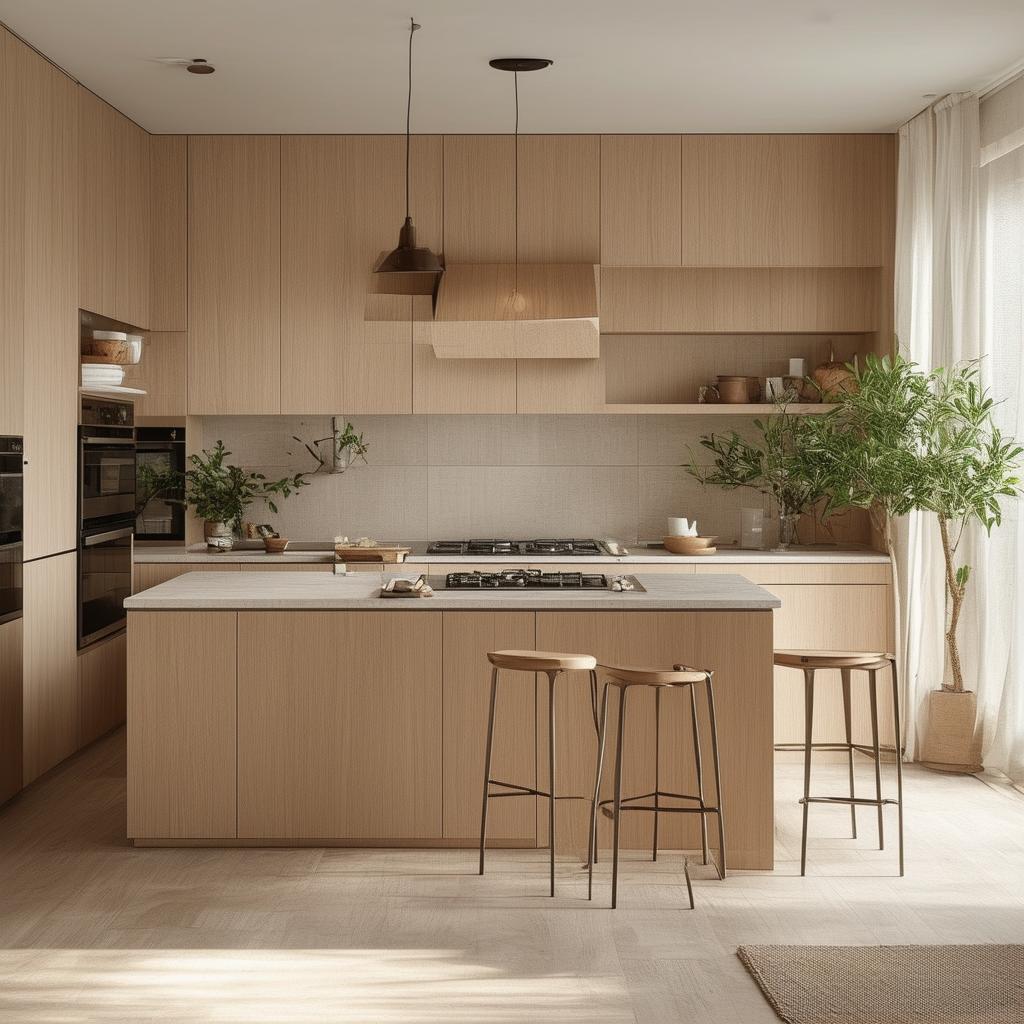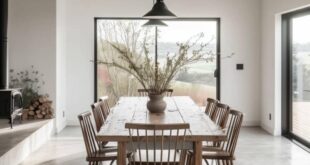The Japandi style combines the minimalist elegance of Japanese interiors with the functional simplicity of Scandinavian spaces, creating spaces that are both visually appealing and extremely practical.
And Japandi kitchens are no exception. With natural materials, clean lines, neutral tones and smart storage solutions, every element in these spaces is carefully chosen and serves a purpose.
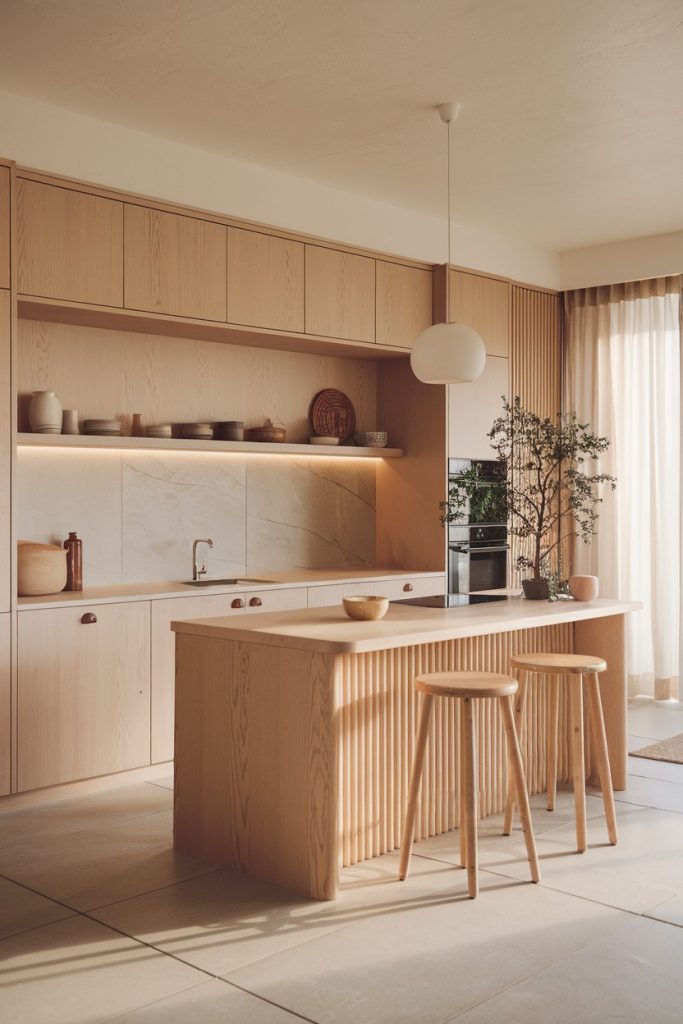
So if you’re planning a remodel or looking for inspiration for subtle upgrades, incorporating Japandi elements into your kitchen is a great way to increase its efficiency while achieving a calming aesthetic.
To inspire you, we’ve put together a curated selection of Japandi kitchen ideas below. Read on to see where beauty and practicality come together in perfect harmony!
35 Japandi Kitchen Ideas: Practical Minimalist Designs
1. Open shelves
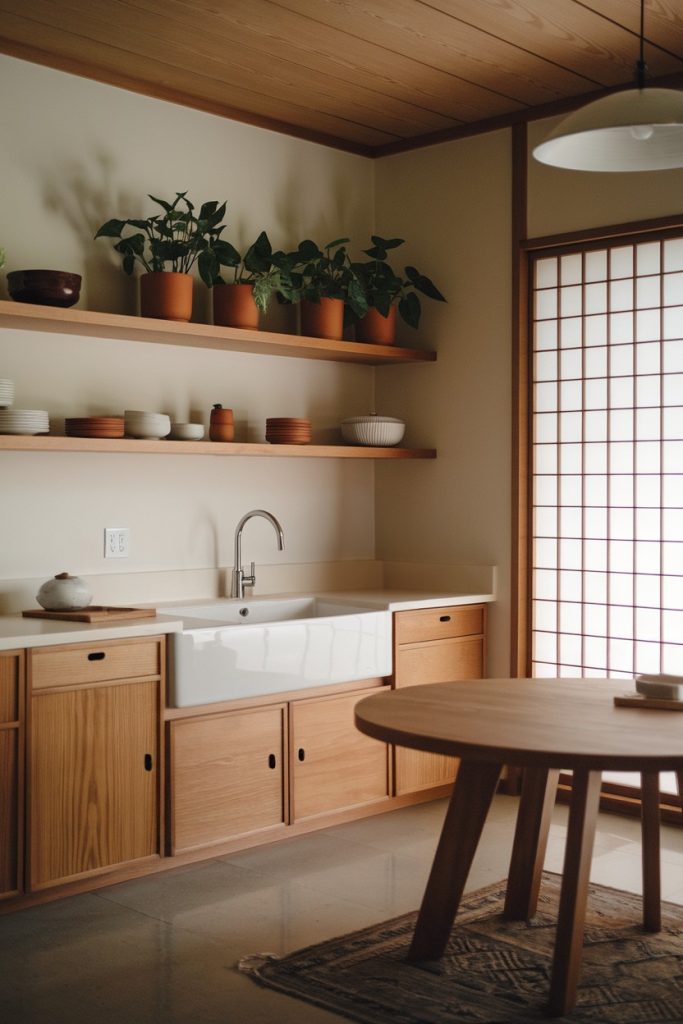
The epitome of functional elegance open shelves This Japandi kitchen is made of smooth wood. These provide the perfect place to display carefully arranged potted plants or handmade tableware.
2. Neutral color palette with deep earthy accents
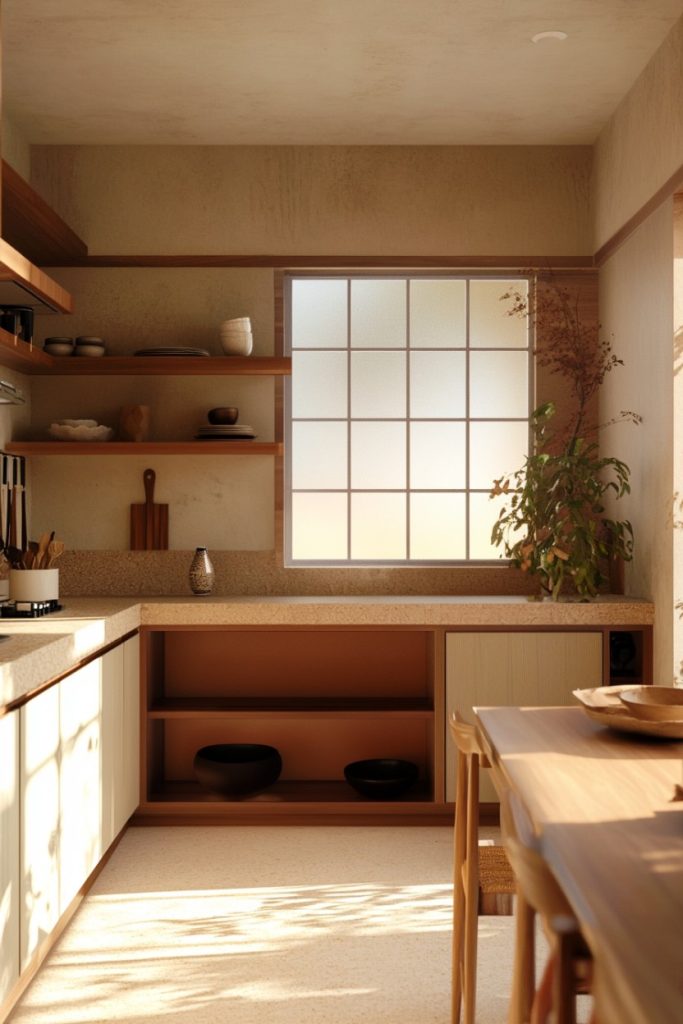
Beige and taupe tones dominate this kitchen, while wood tones add a touch of warmth and texture as accents. Opt for worktops made of light granite and whitewashed walls as a wabi-sabi element.
The balance between light and deep tones creates a visually stimulating yet calming atmosphere.
3. Wooden island with clean lines
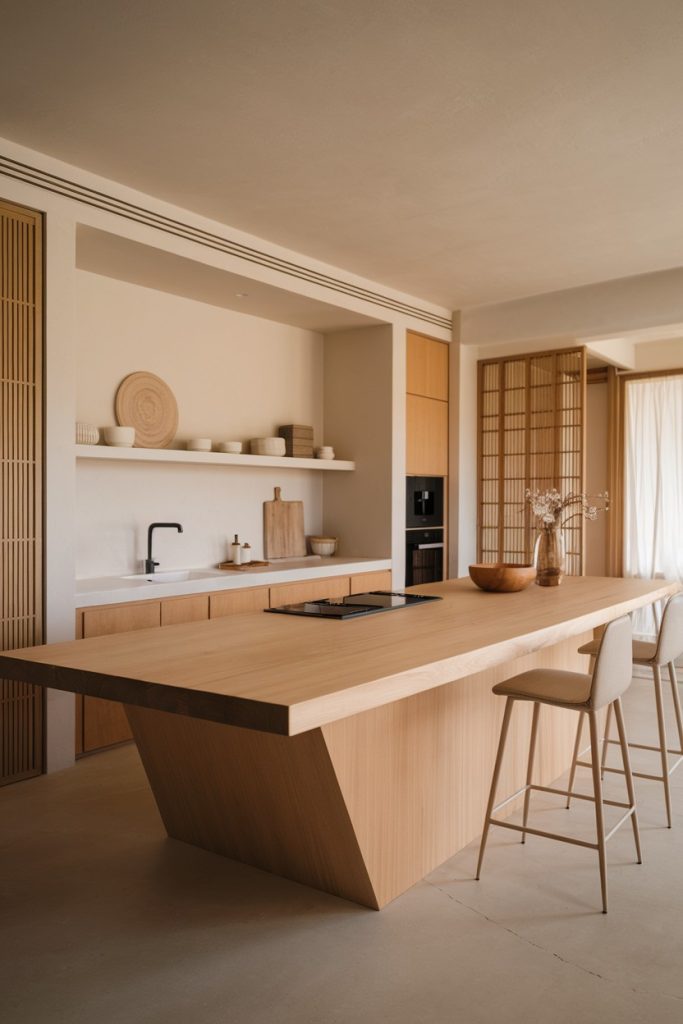
Clear, smooth, angular lines characterize the wooden island in this kitchen, providing ample space for preparing food and keeping kitchen utensils within easy reach. The light wood also blends in with the light, neutral design of the room.
Opt for wooden slats as accent pieces throughout the room for the distinctive Japandi look.
4. Slatted frame
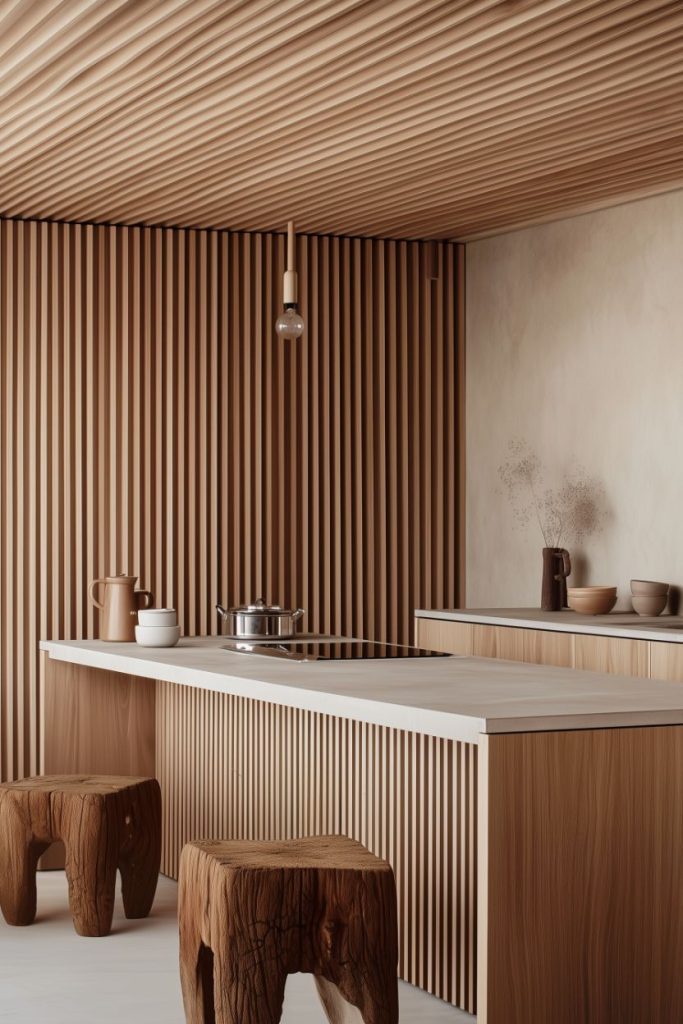
Whether used as an accent wall or part of the island, wooden slats can give your Japandi-style kitchen a new lease of life. Its vertical lines create a visual rhythm and attract more attention without overwhelming the overall design of your space.
5. Black fittings
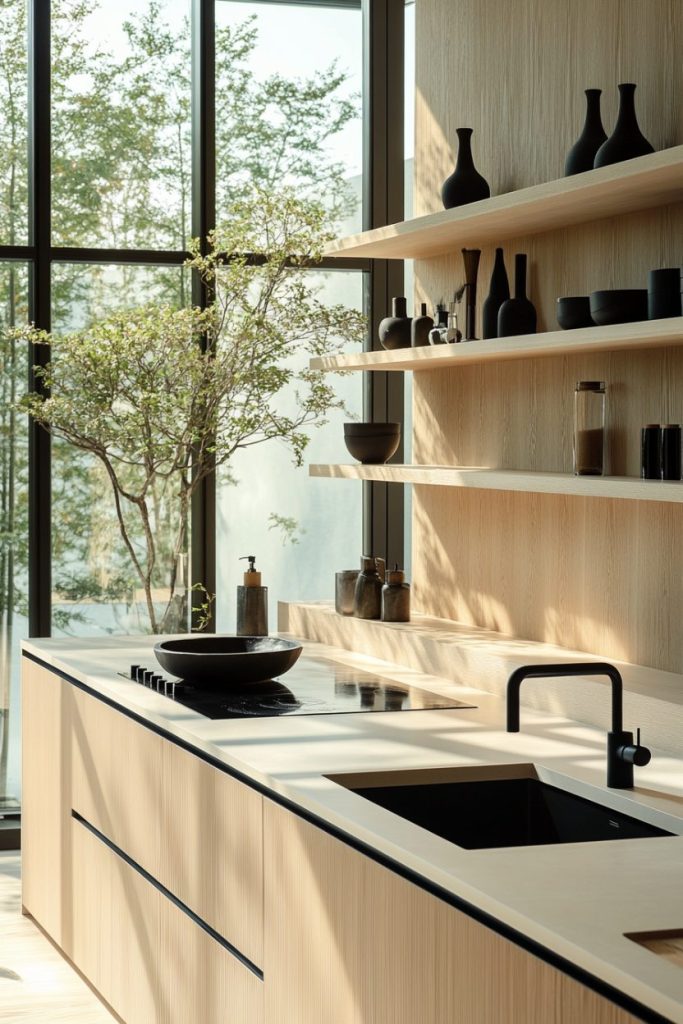
The timeless style of Japandi kitchens makes them versatile enough to be paired with various accents of your choice, including black faucets for a modern contrast. Black faucets and a black sink add a modern touch to this space.
Decorate the room with black stoneware to add traditional Japanese accents.
6. Beadboard paneling
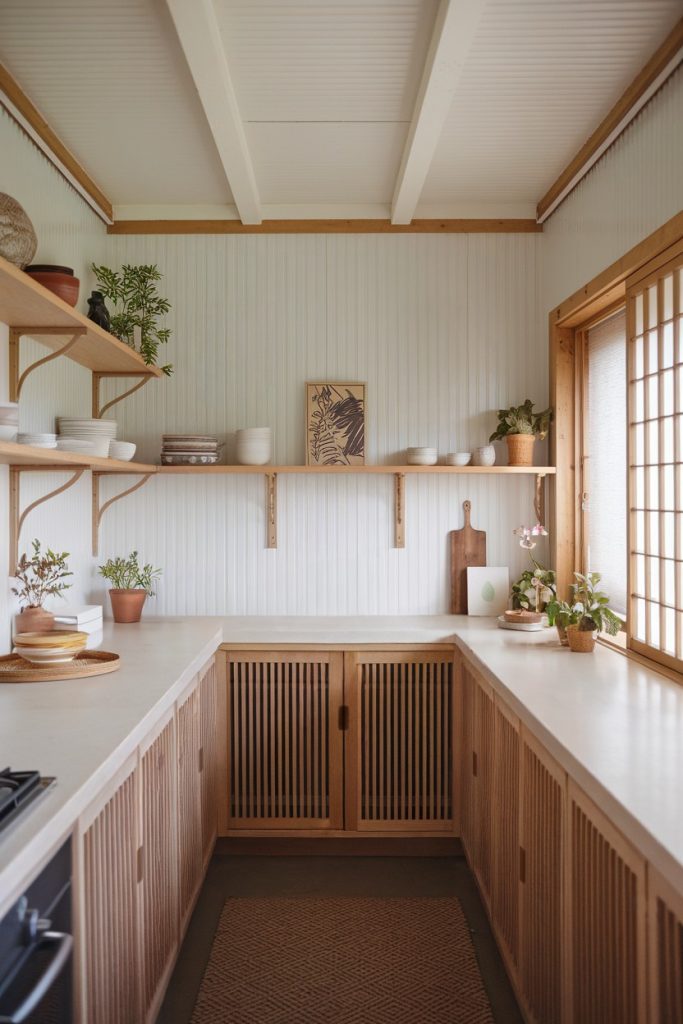
To add dimension and charm to your kitchen, opt for beadboard paneling. This subtle feature complements traditional interior styles while matching Japandi Minimalismopen shelves and wooden slats.
7. Handleless wooden cabinets
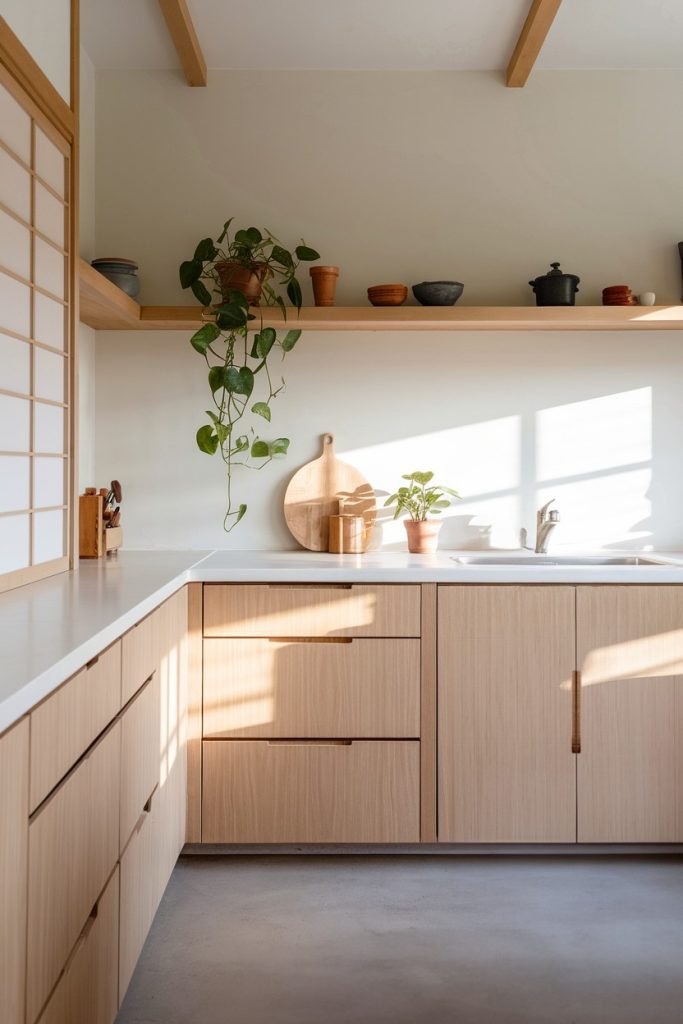
Handleless cabinets give your kitchen an elegant, uninterrupted flow that is a hallmark of Japandi designs. Opting for this minimalist approach is great for a clean, streamlined aesthetic.
8. Natural stone back wall
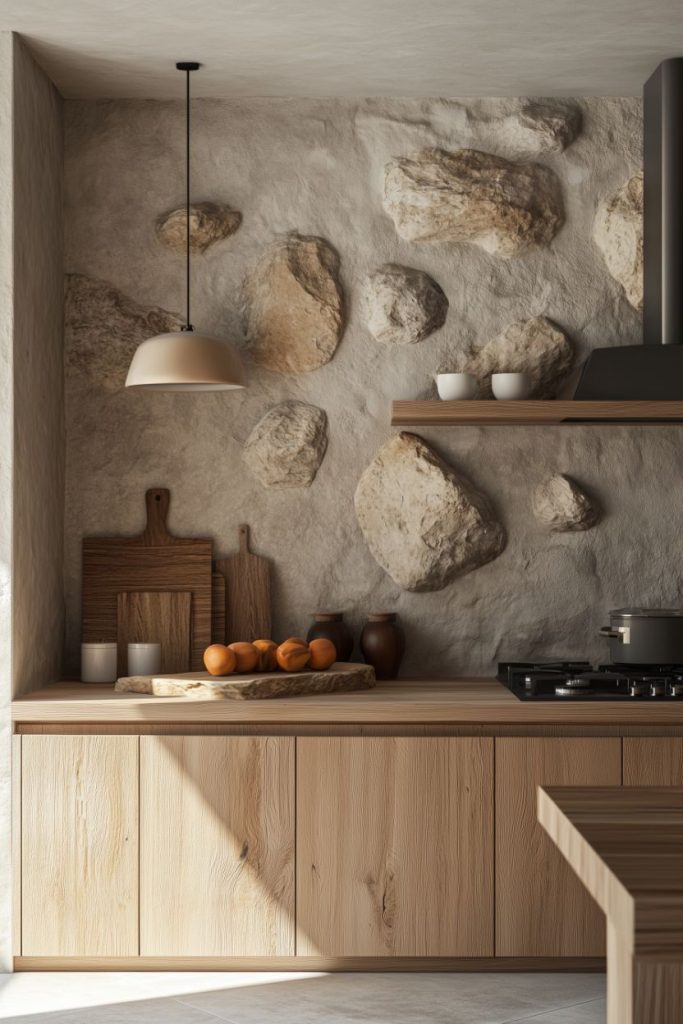
If you want to add a wabi-sabi focal point to your kitchen without disrupting the serene look of a minimalist kitchen, try a natural stone backsplash. It has a rough, earthy and slightly rough feel that prevents a dull or boring look.
9. Light wood floors and dining room set
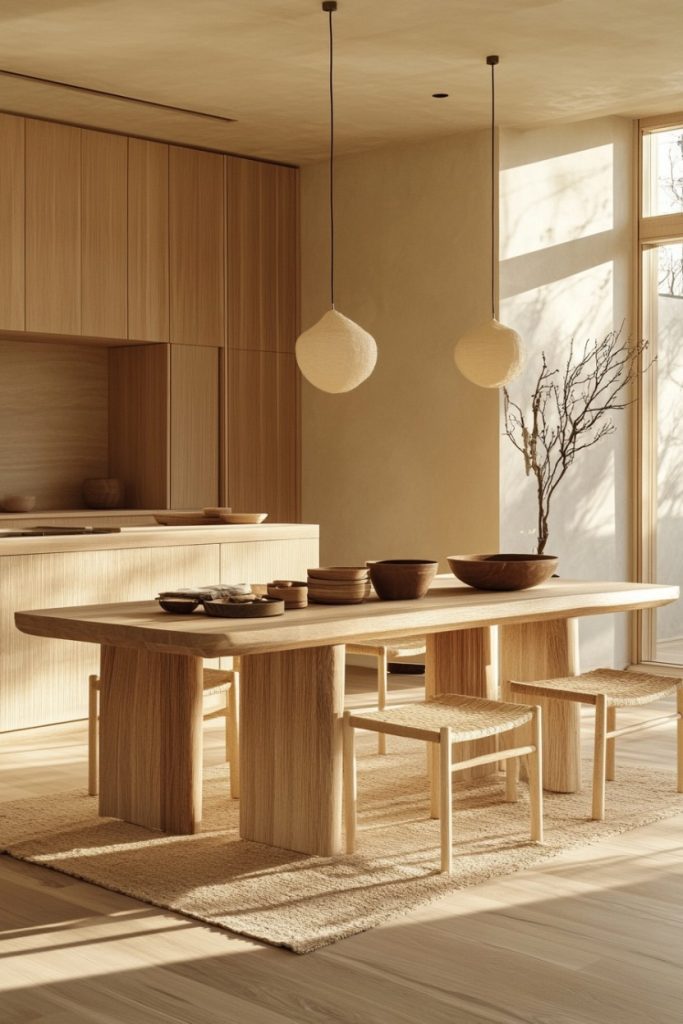
The dining room set of this Japandi eat-in kitchen evokes the light wooden floor to achieve the consistency that is at the forefront of the interior design style. With these elements, the kitchen appears warm, spacious and completely cohesive.
10. Wabi-Sabi elements
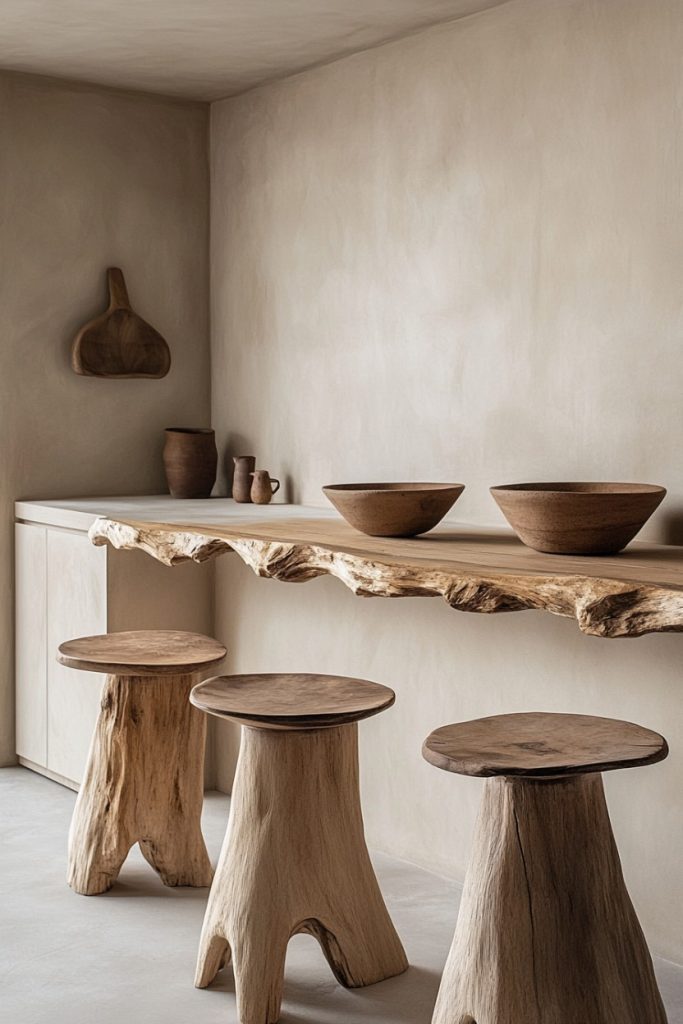
Live-edge bar stools and counters, as well as handcrafted wooden bowls, bring the wabi-sabi ethos of celebrating imperfections and irregularities to your kitchen.
11. Integrated devices

One of Japandi’s fundamental design principles is the combination of form and function, and integrated appliances embody this perfectly.
They blend in with the rest of the room’s features to avoid visual clutter while increasing the functionality of the room.
12. Open concept Japandi kitchen
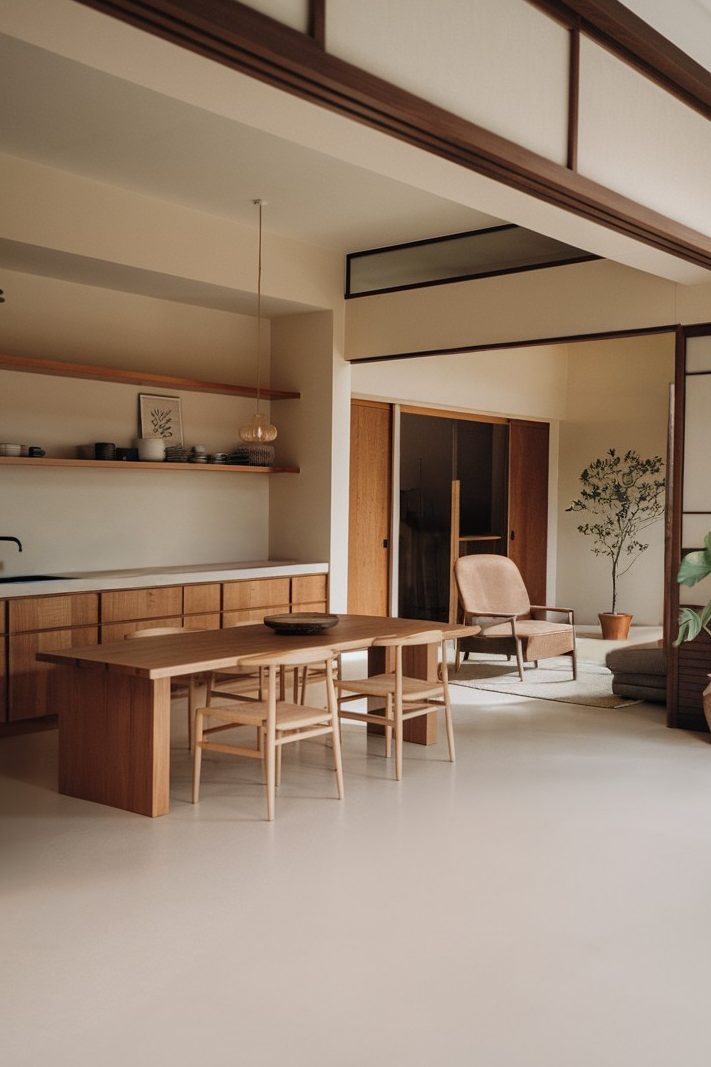
Yes, Japandi style is perfect for one Open concept Kitchen! By removing barriers between different areas in the home, cooking, eating and socializing can flow smoothly.
13. Soft textiles and bedding
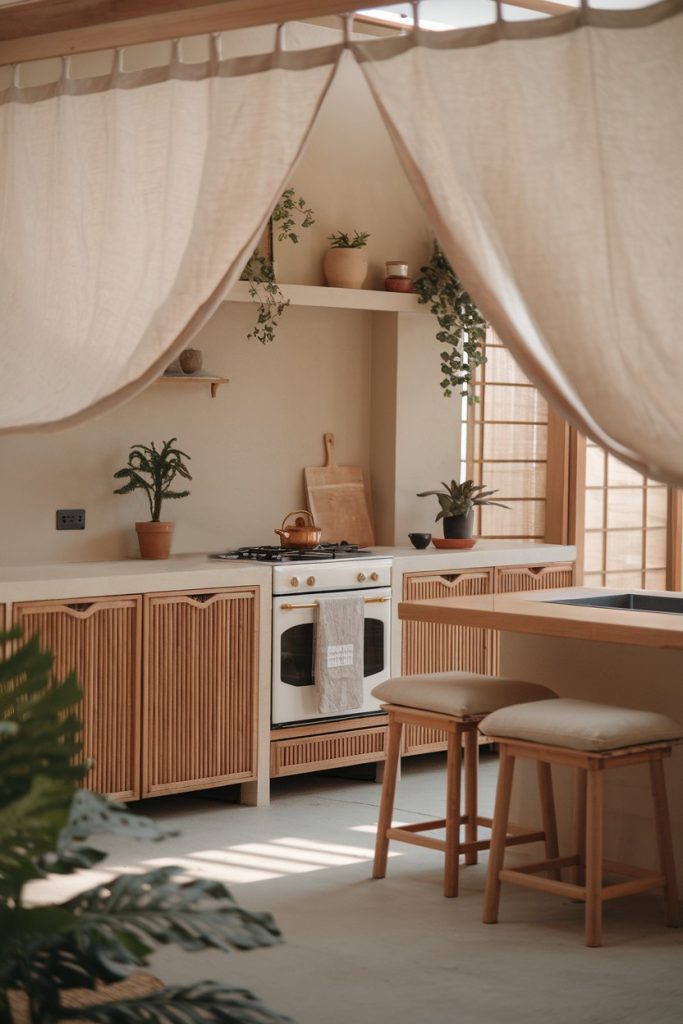
Soft linens drape the surfaces in this room, including curtains, tea towels and pillows. Each one adds a subtle texture and contributes to a cozy, inviting atmosphere in the kitchen.
14. Green kitchen cabinets
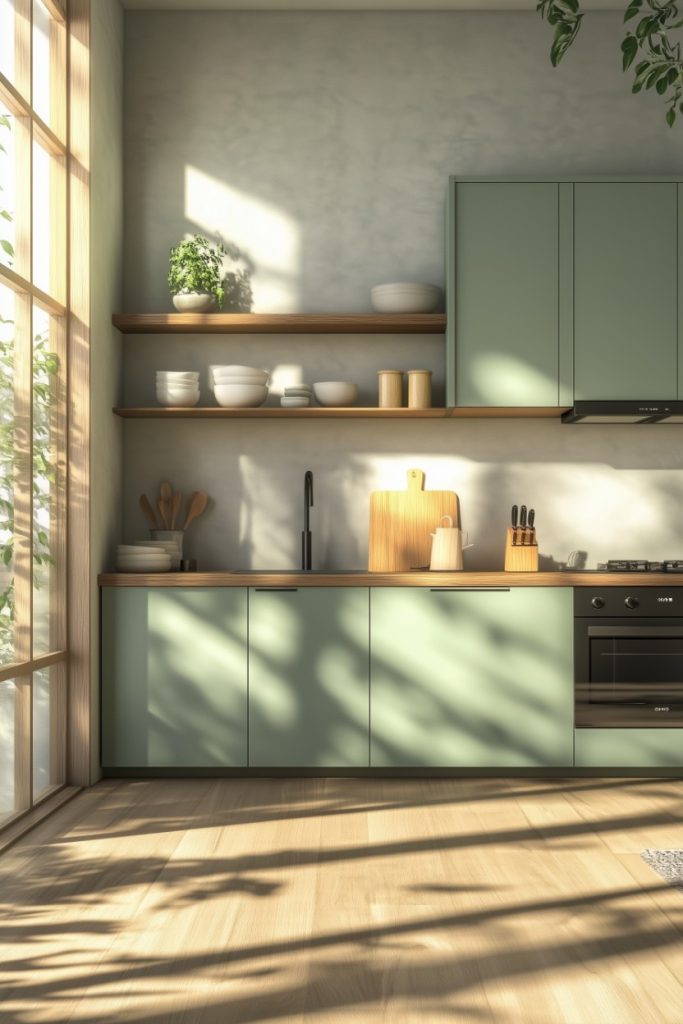
Soothing yet dynamic, muted green cabinets fit perfectly in a Japandi kitchen. The splash of color provides calm, subtly refreshes the room and goes well with light wood tones.
15. Handmade pots
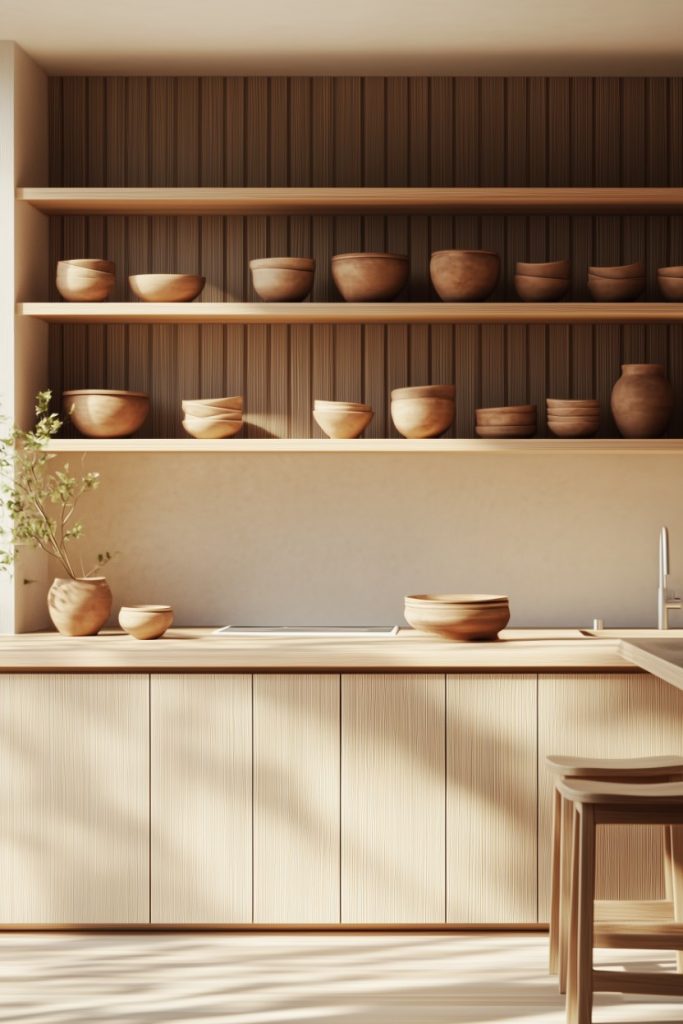
The emphasis on craftsmanship is another defining characteristic of Japandi, so handcrafted pots are a good choice for decorating a Japandi-style kitchen.
Not only do they add an earthy, tactile depth, but they can also be used for cooking!
16. Simple pendant lighting
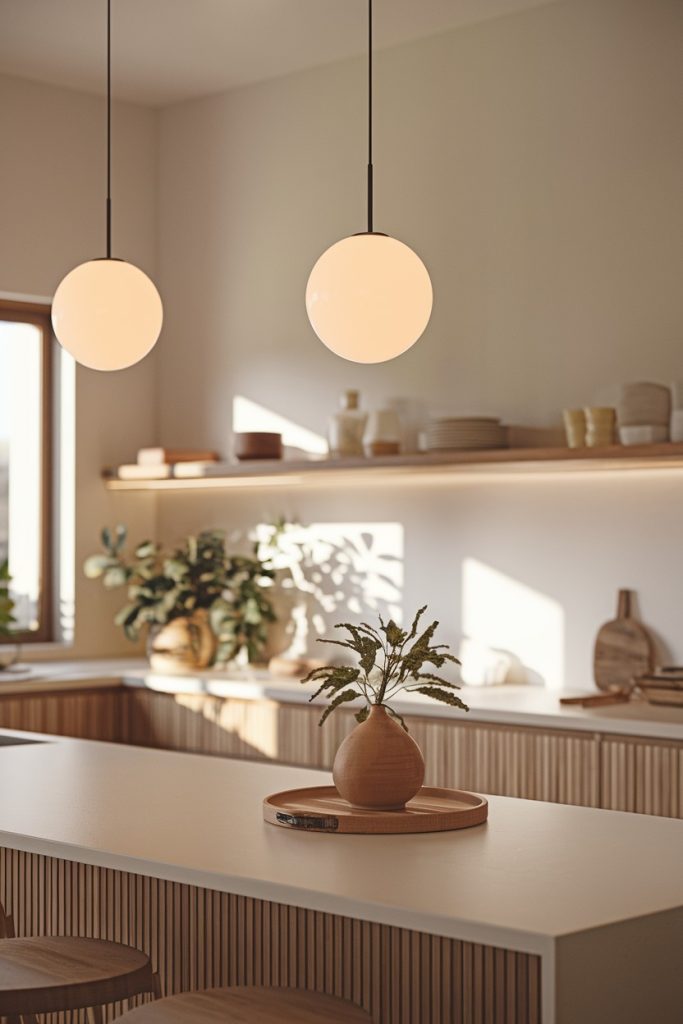
In this Japandi kitchen, simple round pendant lights resemble Asian lanterns, providing mood lighting to brighten the calming surroundings. Their simple design makes them a stunning choice for the room.
17. Bamboo kitchen utensils
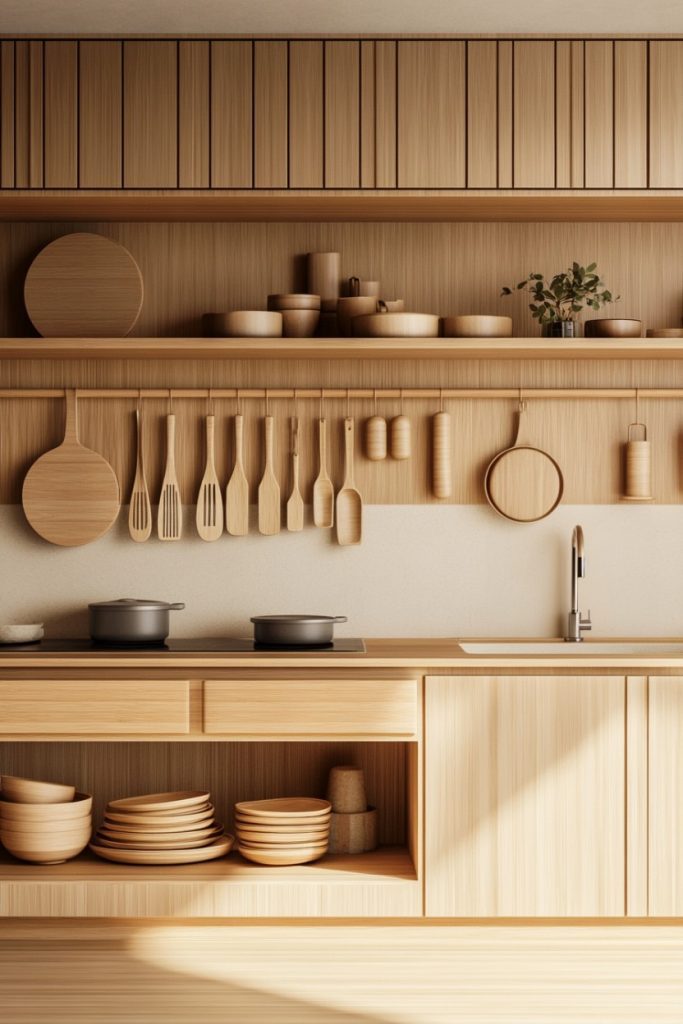
Bamboo kitchen utensils subtly connect all the elements in this space and give it a sense of cohesion. These pieces serve as a tactile connection to nature while also serving as decoration and functional essentials for everyday tasks.
18. Large windows
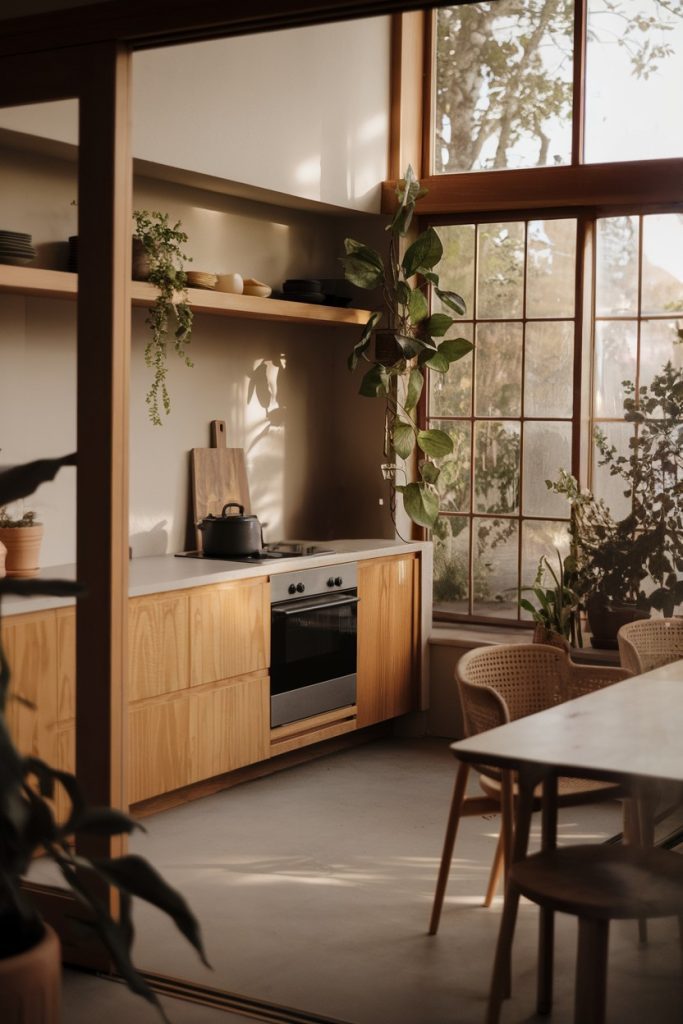
The large windows in this kitchen let in lots of natural light, creating a bright and inviting ambience. In addition, it offers breathtaking outdoor views.
19. Marble and wood
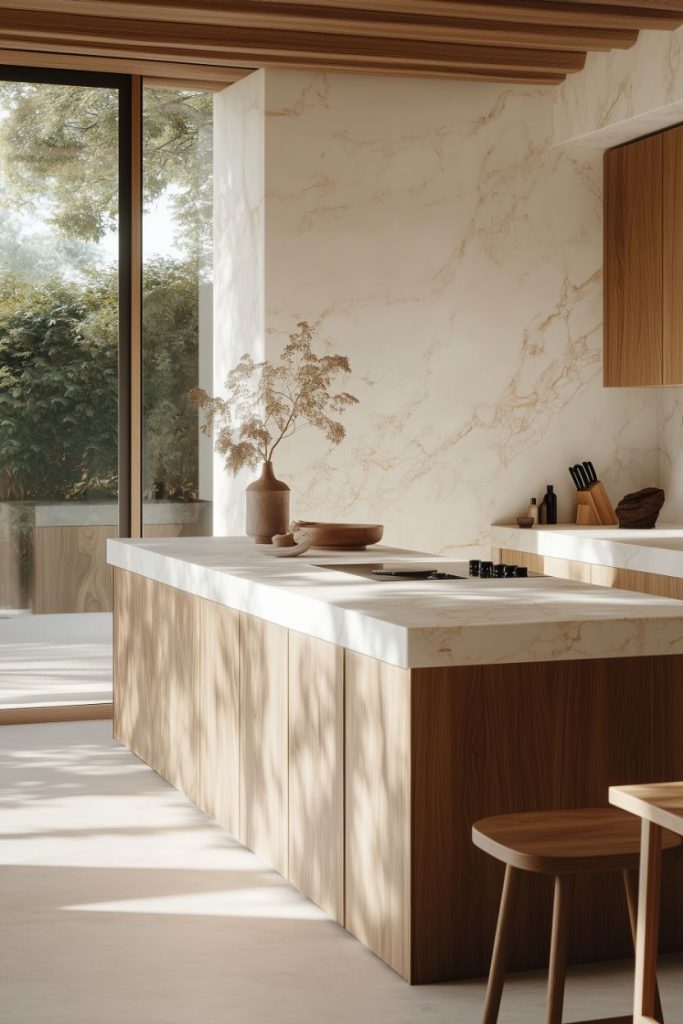
A delightful organic blend of marble and wood enhances the natural elegance of this Japandi kitchen. Soft white marble countertops complement the warmth of wooden cabinets, providing a sophisticated contrast that enriches the space.
20. Sustainable materials
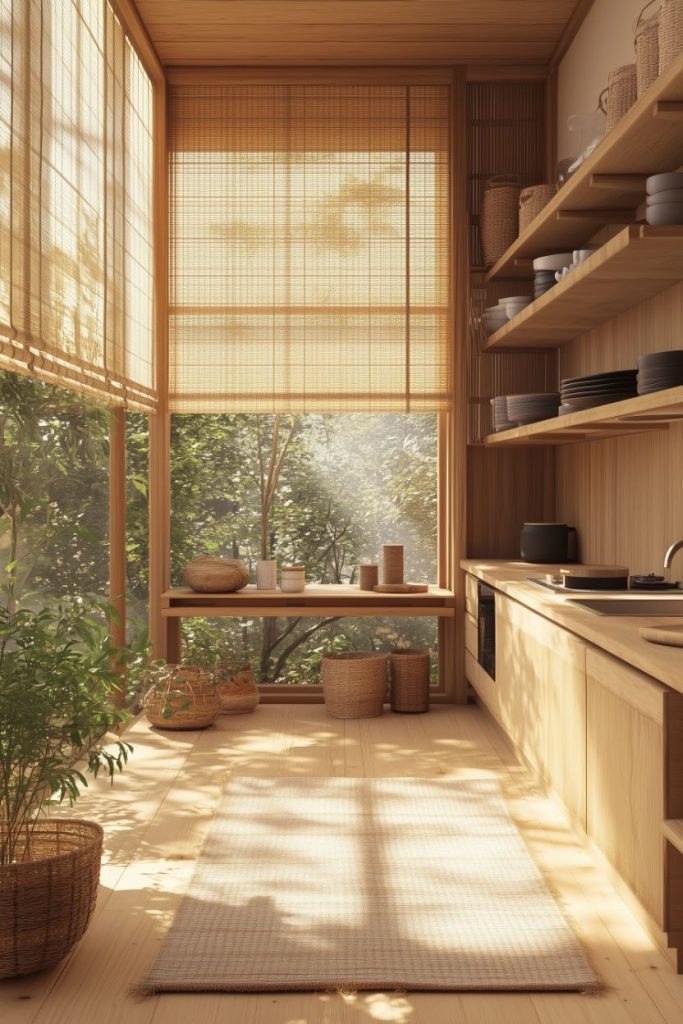
This kitchen is designed to be eco-friendly, using recycled bamboo and sustainable fabrics. All of these materials help you create a harmonious, environmentally conscious kitchen.
21. Vertical backsplash with subway tiles
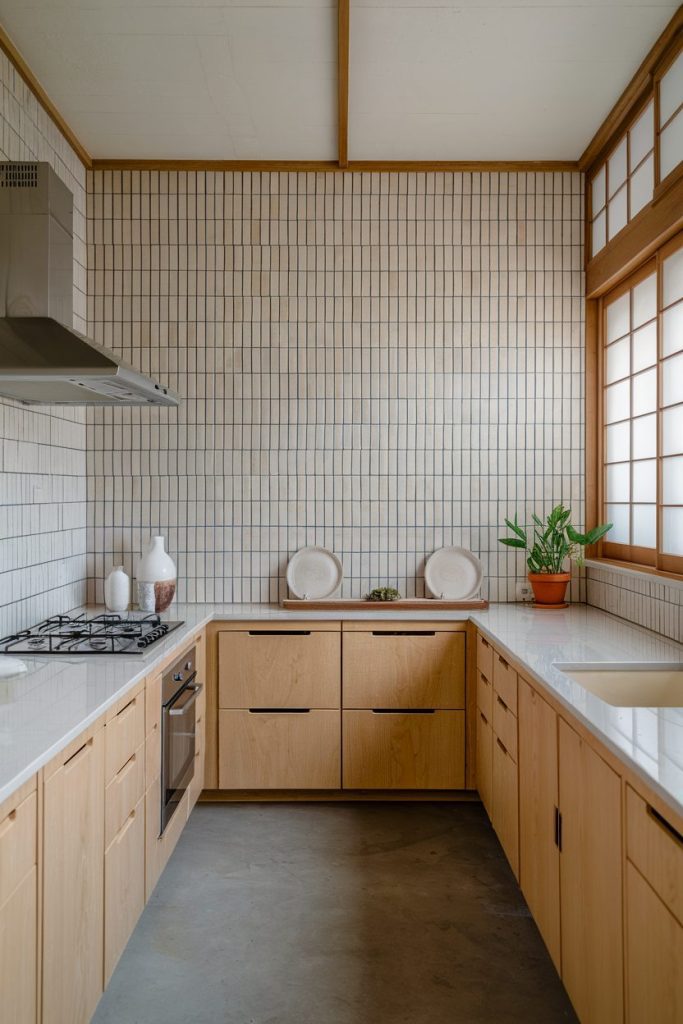
With a clean, consistent pattern, this vertical subway tile backsplash complements the minimalist aesthetic of this Japandi bathroom. It provides a much-needed touch of texture and draws the eye upward to create a feeling of height.
22. Subtle patterns in wallpaper
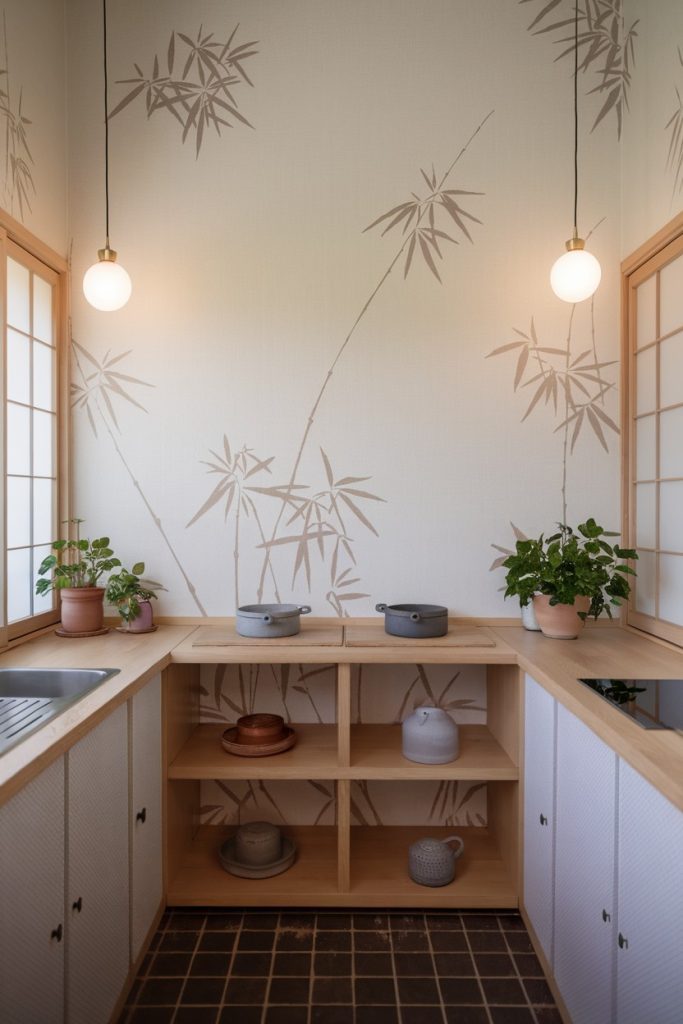
Don’t worry; You don’t have to sacrifice your love of patterned wallpaper for a Japandi-style room.
You can opt for subtle, nature-themed prints – like leaf silhouettes or minimalist depictions of bamboo trunks – in soft, neutral tones to match the theme.
23. Rattan dining set
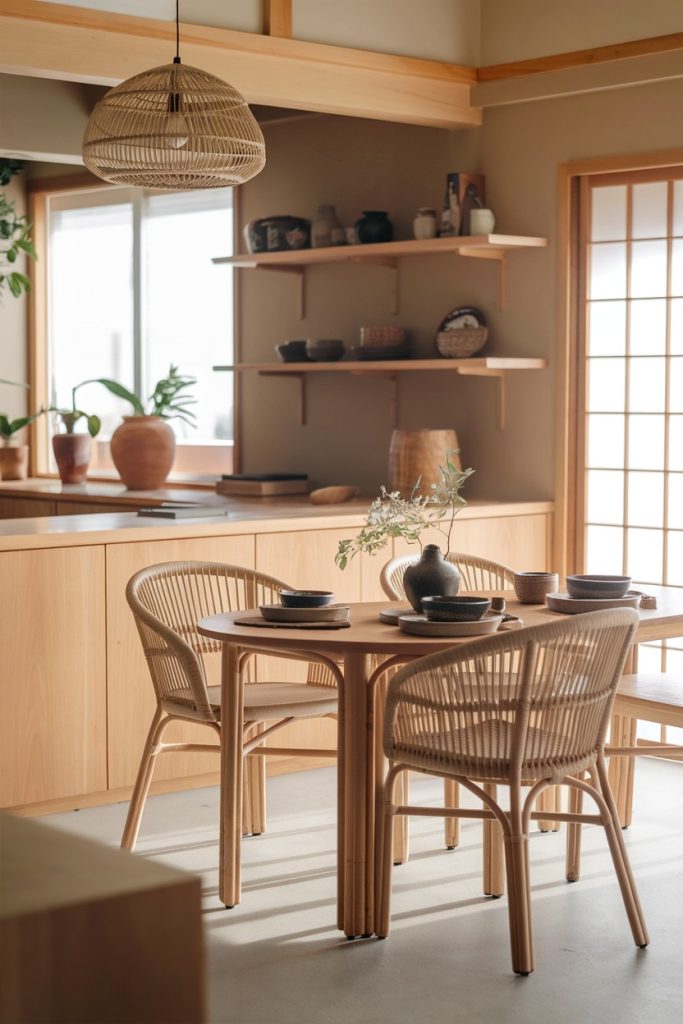
A classic choice for tropical interiors, a rattan dining room set can add organic texture and provide a chic, cozy dining experience. Decorate it with Japanese ceramics and earthenware to celebrate the fusion of styles.
24. Black and white color palette
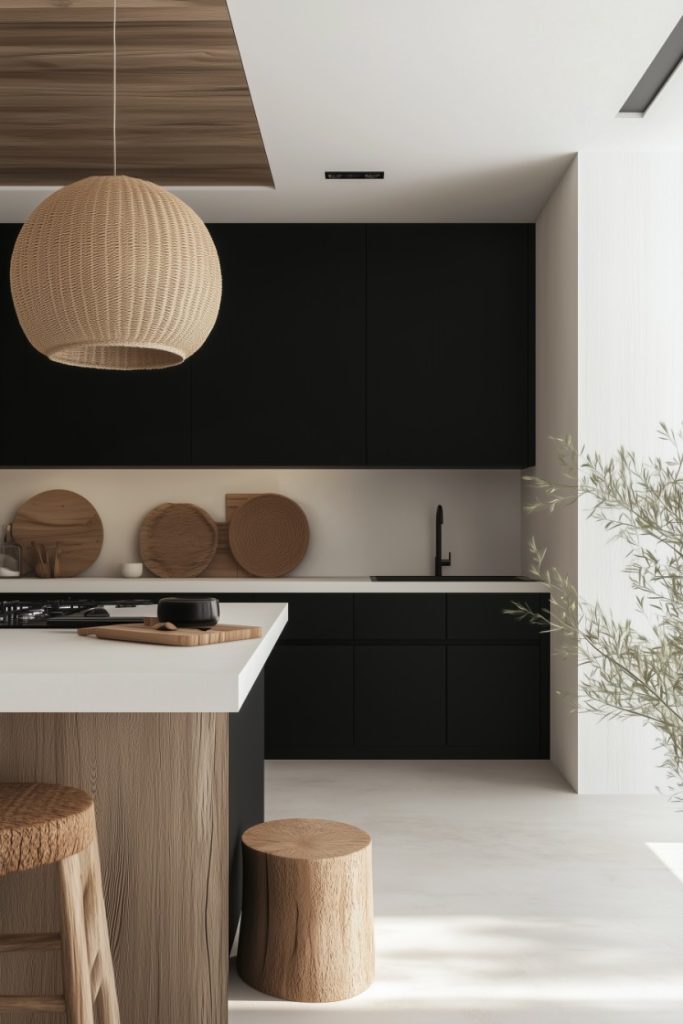
While the Japandi leans towards calm color schemes, a contrasting palette can also work well with the right design.
For example, this kitchen features matte black cabinets, white countertops, and wood accents for a less harsh contrast, balanced by wood countertops, warm gray walls, and live plants.
25. Scandinavian style pot rack
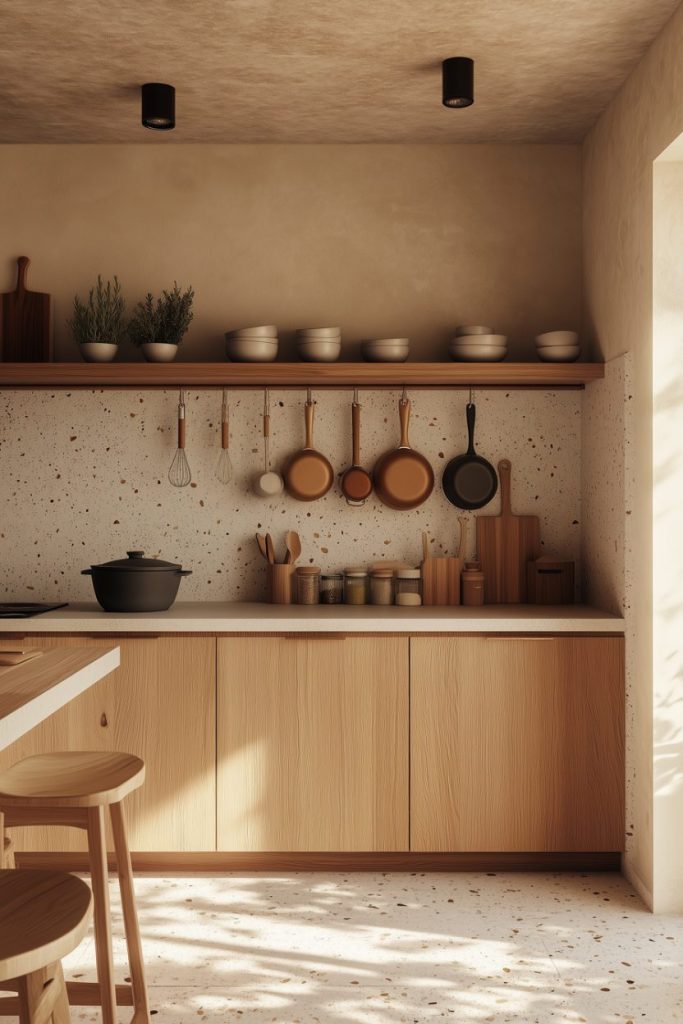
Here, a Scandinavian-style pot rack saves space while providing an eye-catching flair. It’s a clever way to display cookware without cluttering up the countertop.
Opt for wabi-sabi elements on the floor, fixtures and walls for a predominantly Japandi look.
26. Mixture of light wood and dark wood
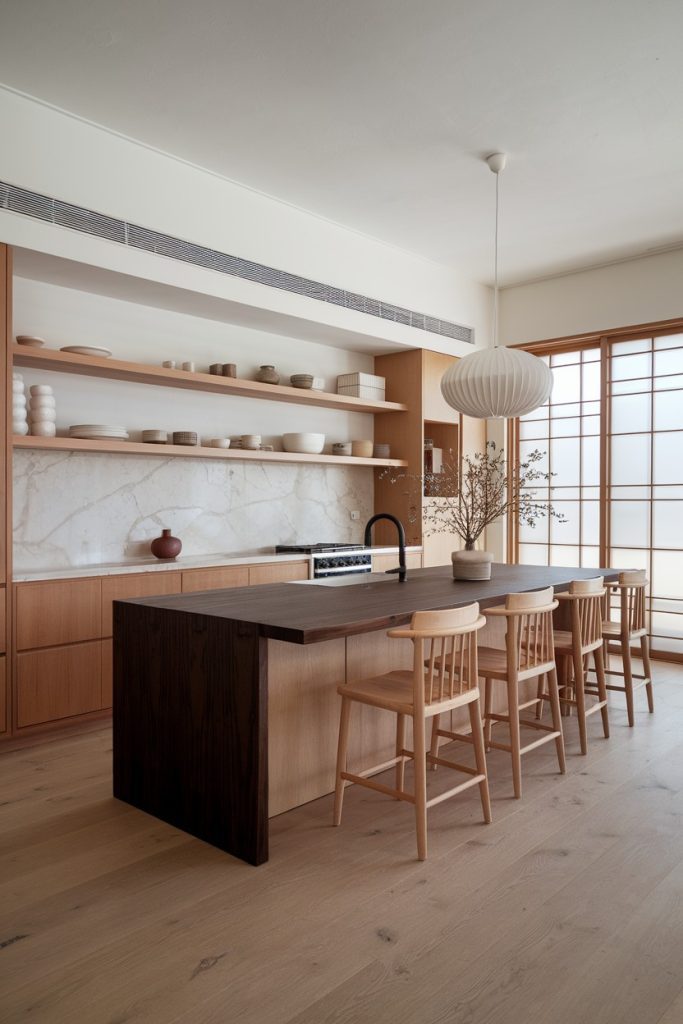
Light wood is often predominant in Scandinavian interiors, while dark wood is preferred in Japanese interiors. Combining the two in your space can add visual interest while maintaining cohesion.
27. Roman blinds made from natural fibers
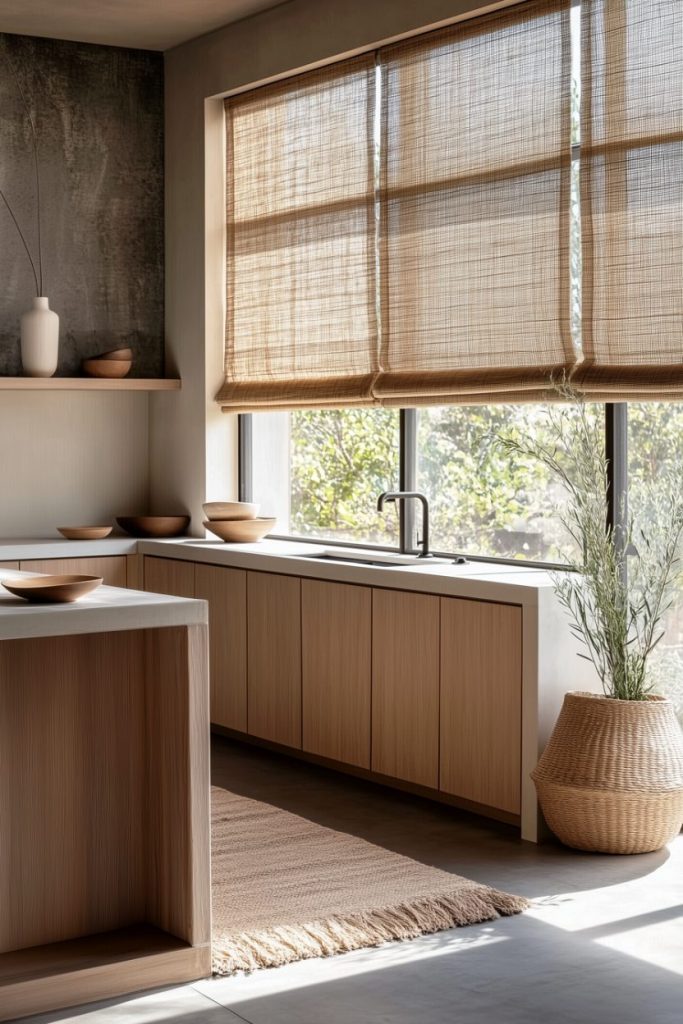
Window treatments such as Roman blinds made from natural fibers enhance the privacy of your Japandi kitchen without compromising the soft, warm and airy atmosphere.
Additionally, their earthy texture complements white stone counters, wooden cabinets, and woven accents.
28. Houseplants
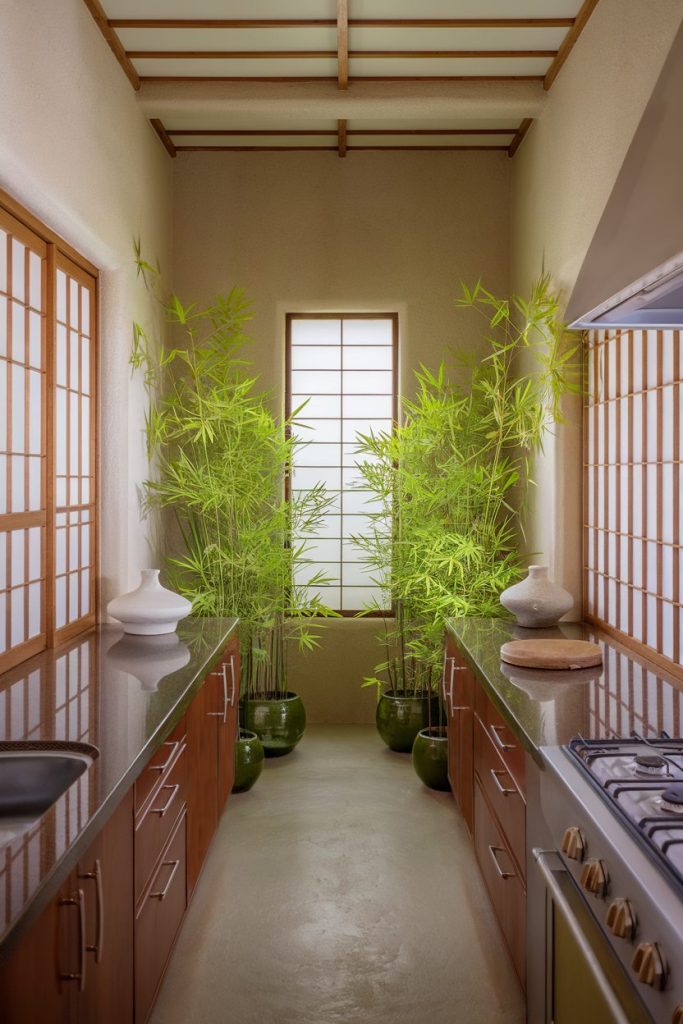
Here, lush bamboo in stoneware planters provides a refreshing liveliness. They stand out against the elegant wooden cabinets, granite countertops and whitewashed walls of the kitchen and their leaves give the room organic shapes.
29. Square tiles
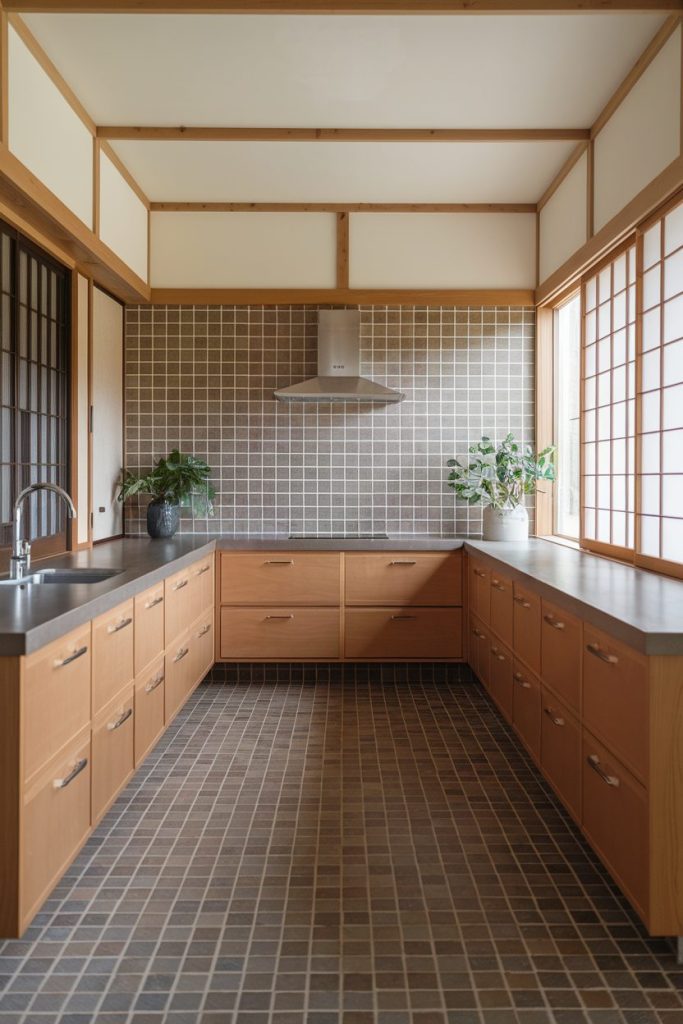
The kitchen splashback with square stone tiles creates an elegant background and emphasizes symmetry and order. Similar tiles are used for flooring to create a polished, uniform appearance.
30. Leather bar stool and dark wood island
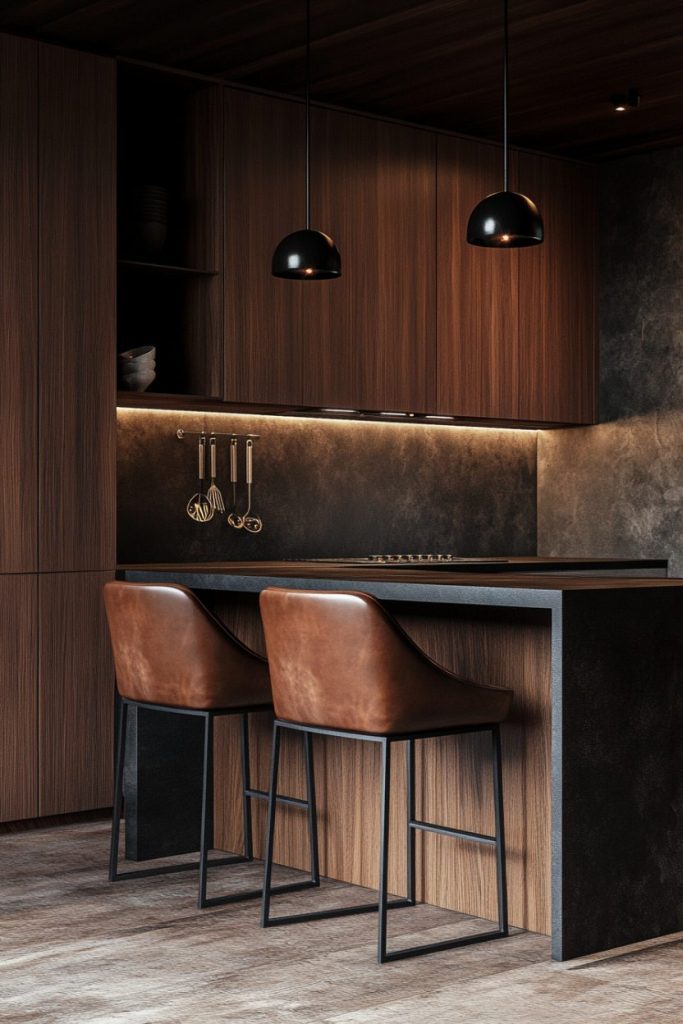
For a more atmospheric take on a Japandi-style kitchen, opt for this setup. Leather bar stools and a dark wood island with a stone countertop add depth to the space while providing a functional, comfortable place to prepare and eat.
31. Shoji style sliding doors
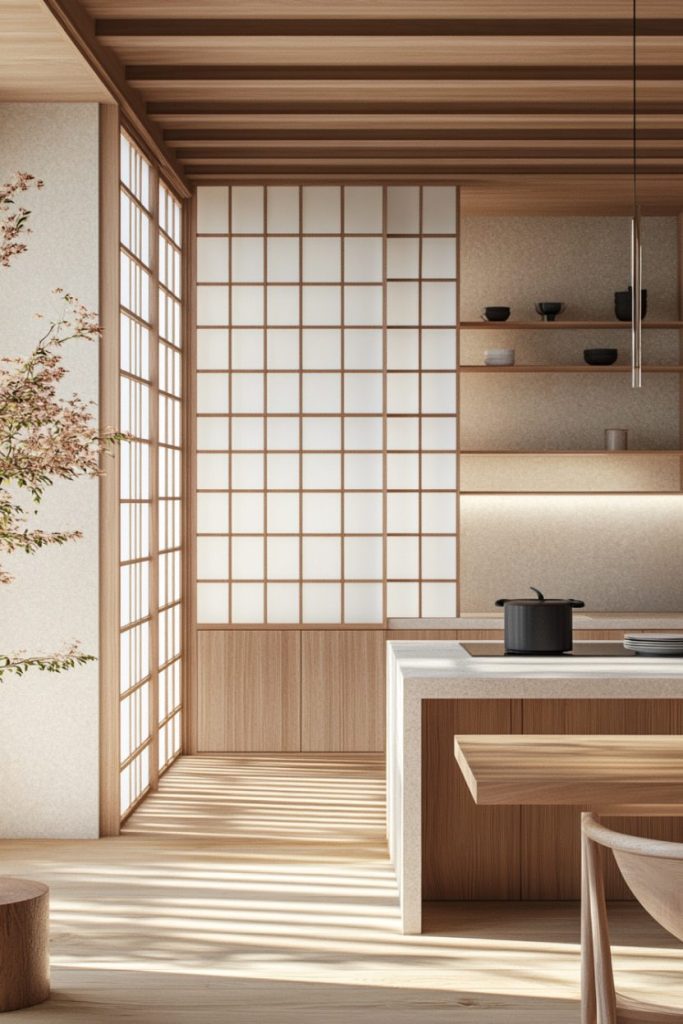
Shoji-style sliding doors emphasize the functionality and elegance of this kitchen. They are particularly suitable for smaller spaces as they can help define and separate areas without creating a feeling of closure.
32. Minimalist artwork
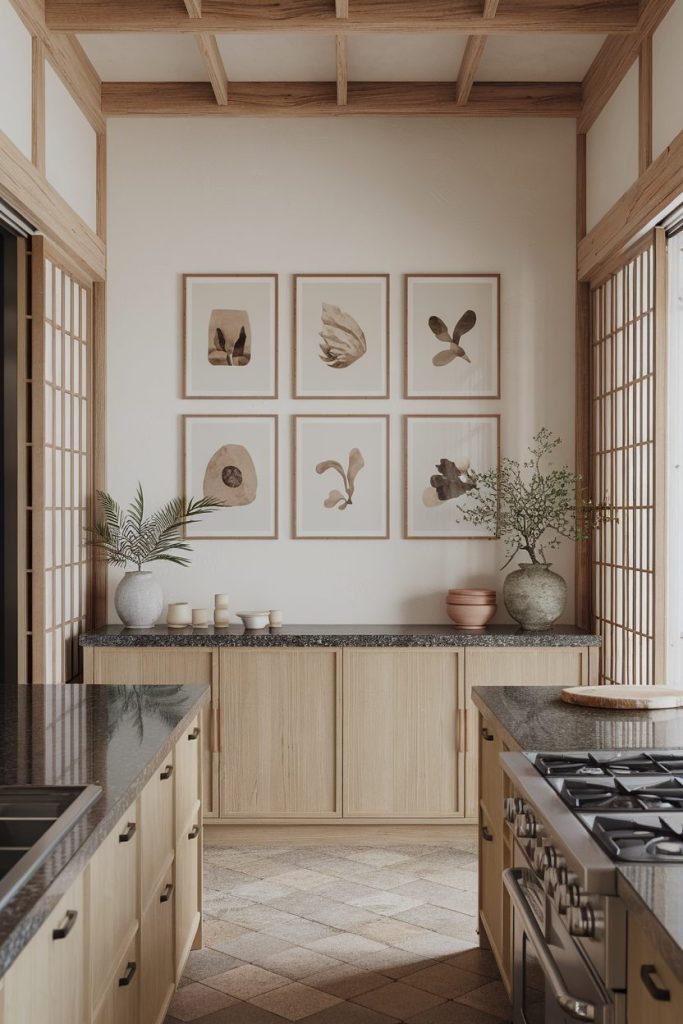
If you want to add a touch of personality to your Japandi kitchen, framed minimalist art is your best choice. You can even create a gallery wall with a series of nature-inspired paintings in similar frames.
33. Floating shelves
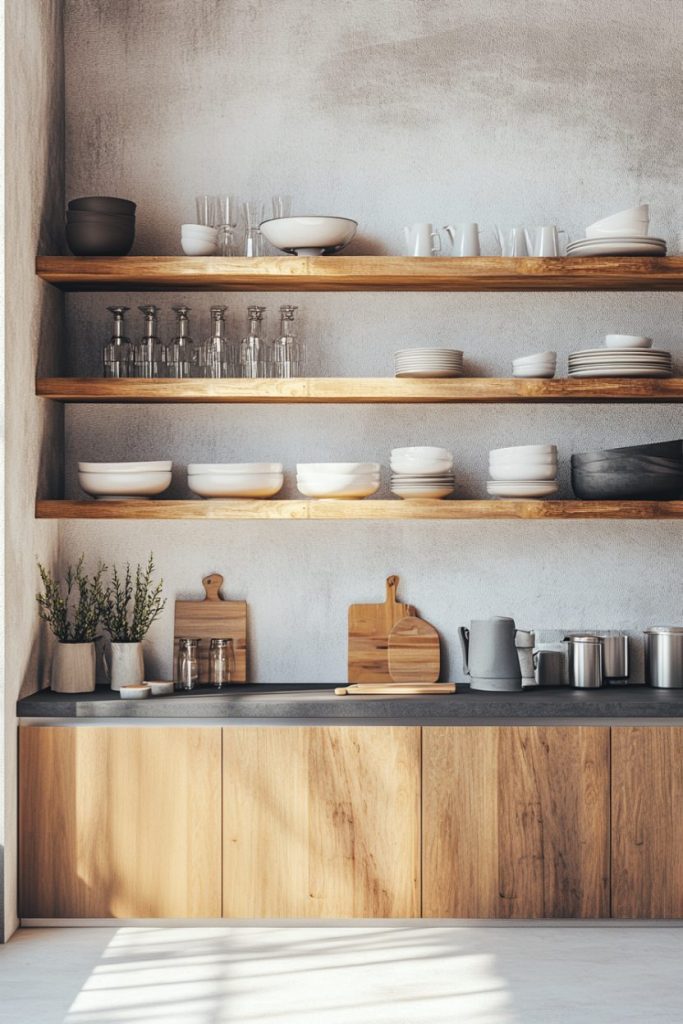
Floating shelves like these can display a wide variety of items, from dishes to decorations, without making the room look cluttered. Complement them with low-profile base cabinets to maximize vertical space.
34. Granite countertops and island
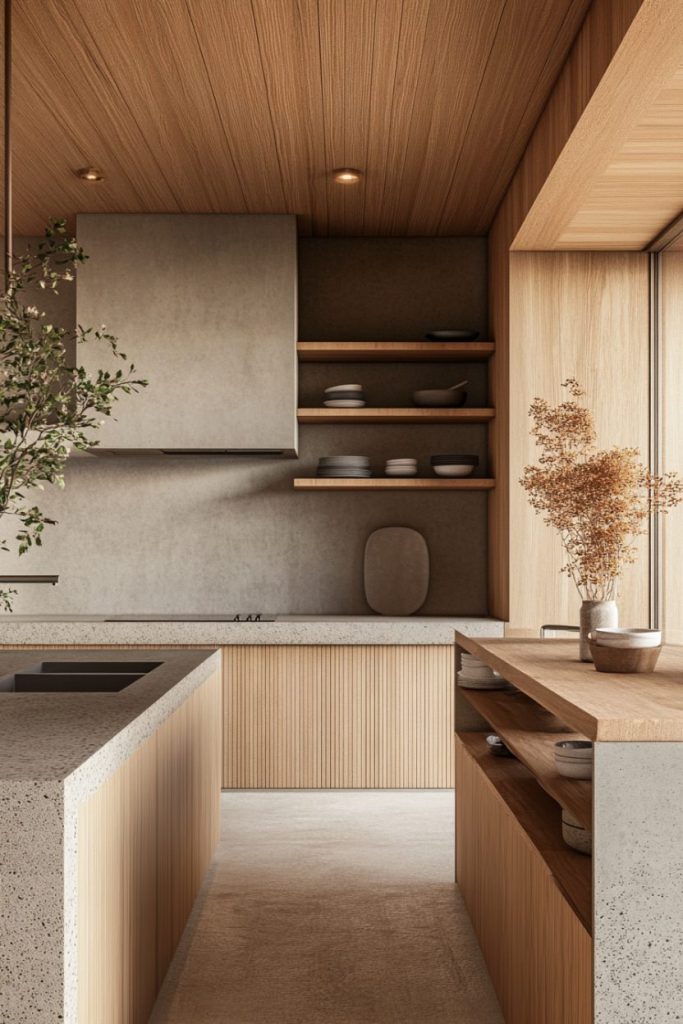
Thanks to the granite countertops and matching island, this Japandi kitchen has a robust look. Combined with light wooden furniture, they create a balanced contrast of raw and refined textures.
35. Reclaimed wood cabinets
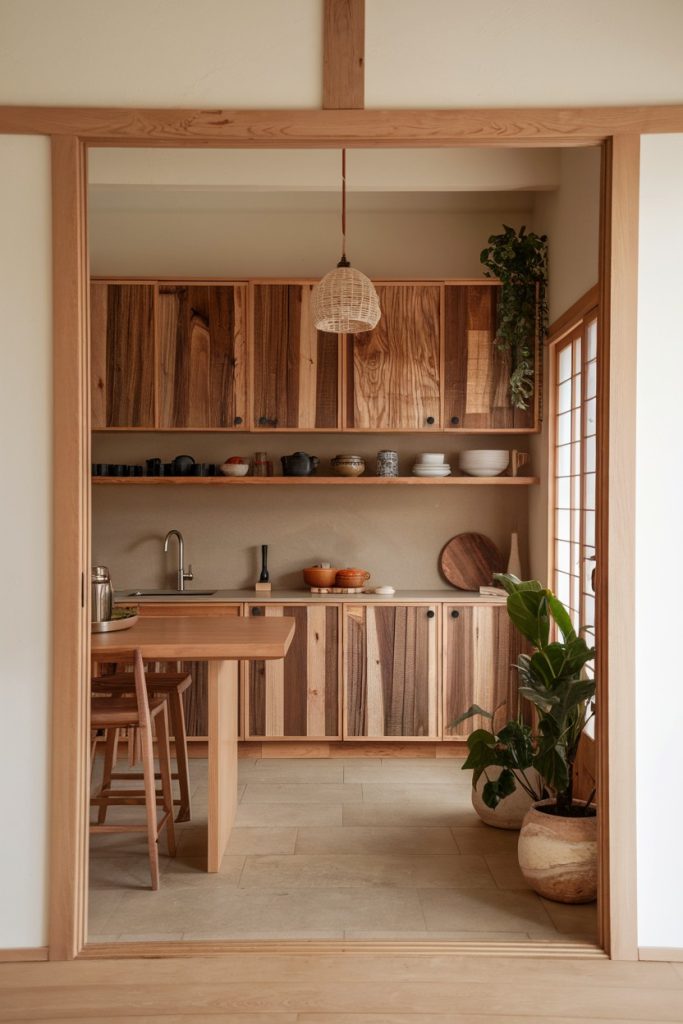
Reclaimed wood cabinets can highlight Japandi’s focus on sustainability and style. Remember to balance them with elegant furnishings that highlight their unique grain.
Simplicity meets elegance in a Japandi kitchen!
As you can see from the variety of ideas above, Japandi’s design principles can help create visual harmony and smooth efficiency in your kitchen.
The natural materials, calming color palettes and thoughtful organization of these designs provide the perfect blueprint to transform any kitchen into an oasis of calm.
So adopt Japandi’s approach for a kitchen that meets your practical needs while enhancing your well-being.
 Decorationg Interior Design
Decorationg Interior Design 